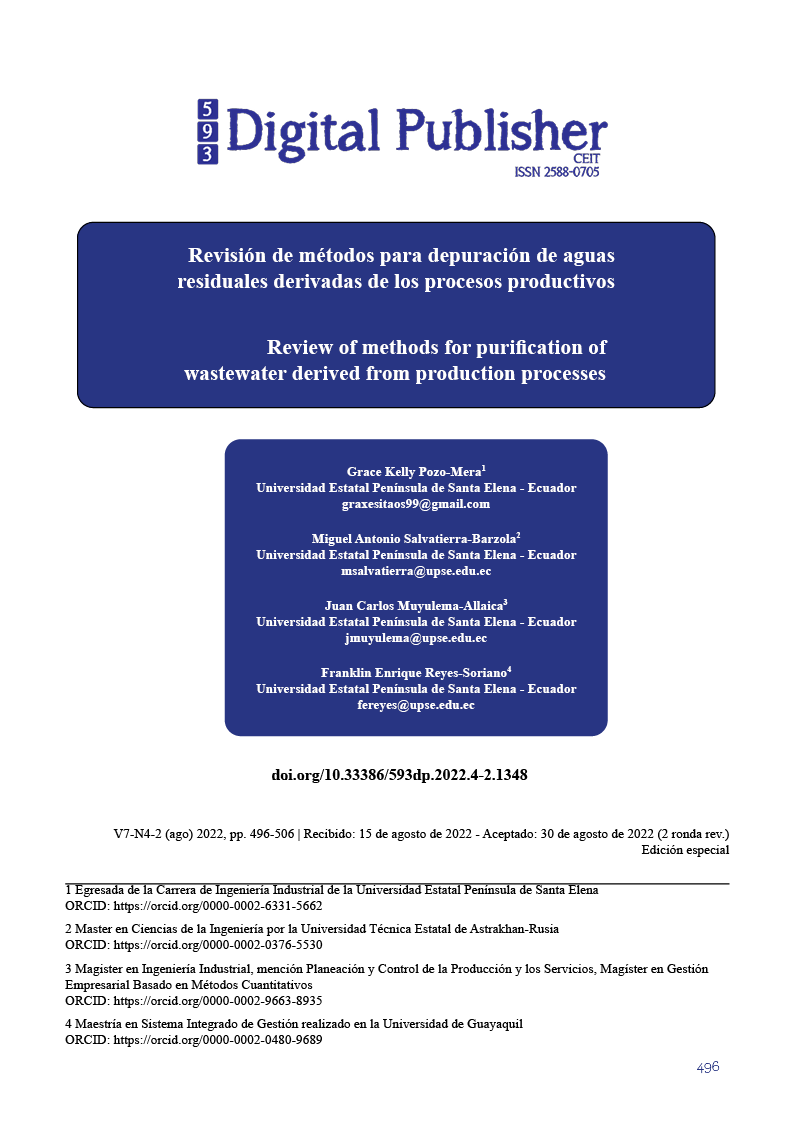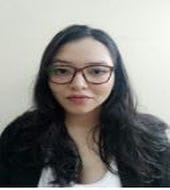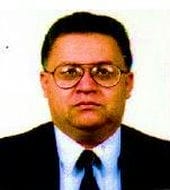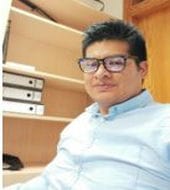Review of methods for purification of wastewater derived from production processes
Main Article Content
Abstract
Introduction. The processes focused on a linear production are characterized by the excessive consumption of natural resources, for which the current challenge of continuous improvement is the application of sustainable management systems that create a cyclical view of production in order to take advantage of resources usually discarded, this concept is taken to the use of wastewater and purification treatments prior to reuse. Objective. Identify the most effective method for wastewater treatment and find a relationship between production methods and wastewater generation. Methodology. Analyzes and reviews of the research sources of the last 7 years were carried out starting from January 1, 2015 to August 8, 2022, in which the systematic review of the literature (SRL) was used through search engines such as Sciencedirect, Scielo.Org, Dimensions and Dialnet, the inclusion and exclusion criteria were also used. Results. The relationship between the variables was established, demonstrating the need to implement treatment plants according to production, for which an analysis of the different treatments was carried out, such as biological, physical and physicochemical ones. Conclusions. Through the SRL, several purification methods were analyzed, from which it was concluded that physicochemical treatments are the most effective for the purification of wastewater generated in industries.
Downloads
Article Details

This work is licensed under a Creative Commons Attribution-NonCommercial-ShareAlike 4.0 International License.
1. Derechos de autor
Las obras que se publican en 593 Digital Publisher CEIT están sujetas a los siguientes términos:
1.1. 593 Digital Publisher CEIT, conserva los derechos patrimoniales (copyright) de las obras publicadas, favorece y permite la reutilización de las mismas bajo la licencia Licencia Creative Commons 4.0 de Reconocimiento-NoComercial-CompartirIgual 4.0, por lo cual se pueden copiar, usar, difundir, transmitir y exponer públicamente, siempre que:
1.1.a. Se cite la autoría y fuente original de su publicación (revista, editorial, URL).
1.1.b. No se usen para fines comerciales u onerosos.
1.1.c. Se mencione la existencia y especificaciones de esta licencia de uso.
References
Abner, L., Pire-Sierra, María Gabriela, L.-C. E., Molina-Quintero, L., & Pire-Sierra, M. C. (2017). Biological Treatment of Wastewater Generated in a Soft Drink Industry. Agroindustria Sociedad Y Ambiente Asa, 1(8), 92–110.
Aldea Molina, A. L. (2021). Influencia Del Rediseño De Los Procesos Productivos De Una Empresa De Envolturas Flexibles Basado En La Mejora Continua. Industrial Data, 24(1), 7–22. https://doi.org/10.15381/idata.v24i1.19616
Almeida, T., Montenegro, A. A., Carvalho, A. A. de, & Tabosa, J. N. (2021). Soil And Crop Spatial Variability In Maize Irrigated With Domestic Effluent. Dyna, 88(219), 111–117. https://doi.org/10.15446/dyna.v88n219.92874
Arteaga-Sarmiento, W. J., Villamil-Sandoval, D. C., & González, A. J. (2019). Caracterización De Los Procesos Productivos De Las Pymes Textileras De Cundinamarca. Revista Logos, Ciencia & Tecnología, 11(2), 60–77. https://doi.org/10.22335/rlct.v11i2.839
Cabrera- Carranza, C. (2019). Compatibilidad Ambiental De La Industria De Harina De Pescado En Paracas - Pisco. Revista Del Instituto de Investigación de La Facultad de Ingeniería Geológica, Minera, Metalurgica y Geográfica, 2(3), 119–134.
Campo, E. A., Cano, J. A., & Gómez-Montoya, R. A. (2019). Optimización De Costos De Producción Agregada En Empresas Del Sector Textil. Ingeniare. Revista Chilena de Ingeniería, 28(3), 461–475. https://doi.org/10.4067/s0718-33052020000300461
Chan-Trinidad, M. G., López-Villarreal, F., Barajas-Fernández, J., Olán-Acosta, M. Á., & Pantoja-Castro, M. A. (2017). Análisis De La Separación De Mezclas De Compuestos De Alta Volatilidad Empleando Métodos Rigurosos Analysis Of The Separation Of Mixtures Of Compounds Of High Volatility Using Rigorous Methods. 1, 1–20. https://doi.org/0.19136/jeeos.a1n3.2160
Chávez-Vera, I. (2017). Diseño E Implementación De Un Sistema De Tratamiento De Aguas Residuales. Dominio de Las Ciencias, 3(1), 536–560.
Cribas, A. J., & Martínez, L. E. (2021). Sistema de Control de Llenado y Nivel de Tanques en Plantas de Tratamiento de Agua. 1–10. https://www.academia.edu/51022587/Paper_Sistema_de_Control_de_Llenado_y_Nivel_de_Tanques
Escobar, M. C., Luis Felipe, T., & Romero-Cuéllar, J. (2016). Design Of An Expert System For Reusing Treated Wastewater. European Journal of Cell Biology, 48(1), 150–153.
Freytez, E., Márquezb, A., Pirea, M. C., Guevarab, E., & Pérez, S. (2019). Design, Construction And Evaluation Of The Performance Of A Load Reactor Sequential For Treatment Of Residual Waters Of Teneries. INGENIERÍA UC, 26.
Gamero, H., & Ostos, J. (2020). Revisión Sistemática De Literatura Sobre Factores Clave En La Identificación De Oportunidades De Negocio. Retos, 10(20), 307–327. https://doi.org/10.17163/ret.n20.2020.07
Hernández-Zamora, M. F., Jiménez-Martinez, S., & Sánchez-Monge, J. I. (2021). Materiales Alternativos Como Oportunidad De Reducción De Impactos Ambientales En El Sector Construcción. Tecnología En Marcha, 34, 3–10.
López-Ortiz, M. I., & Melgarejo-Moreno, J. (2016). Depuración Y Reutilización De Aguas En España. Agua y Territorio, 8, 22–35. https://doi.org/10.17561/at.v0i8.3293
Melgarejo-Moreno, J. (2019). Congreso Nacional del Agua Orihuela. Innovación y Sostenibilidad. Congreso Nacional Del Agua Orihuela. Innovación y Sostenibilidad. https://doi.org/10.14198/congreso-nacional-del-agua-orihuela-2019
Mena-Mejía, S. A., Muyulema-Allaica, J. C., Bermeo-García, M. V., & Reyes-Soriano, F. E. (2022). La norma ISO 45001:2018 y la reducción de accidentabilidad en empresas resilientes. Una revisión sistemática. AlfaPublicaciones, 4(3.1), 187–213. https://doi.org/10.33262/ap.v4i3.1.247
Menéndez, C., & Dueñas, J. (2018). Los procesos biológicos de tratamiento de aguas residuales desde una visión no convencional. Ingeniería Hidráulica y Ambiental, XXXIX(3), 97–107. https://bit.ly/35hSyMk
Morocho-Arroyo, R. F. (2018). The Circular Economy as a Sustainable Development Factor of the Productive Sector. INNOVA Research Journal, 3(12), 78–98.
Muyulema-Allaica, J. C., & Ruiz-Puente, C. (2022). Framework Proposal for the Design of Lean Circular Production Systems Based on Case Studies. Dyna, DYNA-ACELE(0), [7 pp]-[7 pp]. https://doi.org/10.6036/10540
Prieto-Sandoval, V., Jaca, C., & Ormazabal, M. (2017). Economía circular: Relación con la evolución del concepto de sostenibilidad y estrategias para su implementación. Memoria Investigaciones En Ingeniería, 15, 15.
Rajabpour-Ashkiki, A., Felske, C., & McCartney, D. (2019). Impacts of seasonal variation and operating parameters on double-stage trommel performance. Waste Management, 86, 36–48. https://doi.org/10.1016/j.wasman.2019.01.026
Ramírez-Casco, A. D. P., Sanandrés-Alvarez, L. G., & Ramírez-Garrido, R. G. (2019). Análisis de los costos ocultos en el proceso de producción industrial. Revista De Investigación Sigma, 6(02), 51. https://doi.org/10.24133/sigma.v6i2.1673
Rizos, V., Tuokko, K., & Behrens, A. (2017). The circular economy, a review of definitions, processes and impacts. In Centre for European Policy Studies (Brussels, Belgium). https://www.ceps.eu/wp-content/uploads/2017/04/RR2017-08_CircularEconomy_0.pdf
Romano, S. A., Kataishi, R. E., & Durán, L. (2018). La promoción industrial en Argentina: entramado normativo para el caso de la ley 19.640. Economía Sociedad y Territorio, xviii, 947–976. https://doi.org/10.22136/est20181214
Snyder, H. (2019). Literature review as a research methodology: An overview and guidelines. Journal of Business Research, 104(August), 333–339. https://doi.org/10.1016/j.jbusres.2019.07.039
Soledispa-Lucas, F. F., Bailón-Lourido, W. A., & Vásquez-Giler, C. F. (2022). Auditoría de gestión de calidad y mejoramiento continuo de procesos en pequeñas y medianas empresas del sector pesquero, Manta, Montecristi y Jaramijó – Ecuador. 8, 718–729. https://doi.org/DOI: http://dx.doi.org/10.23857/dc.v8i1.2599
Valdés, A., López, E., & Alonso, A. (2019). Gestión de residuos industriales y sostenibilidad, necesidad de un enfoque de economía ecológica. Universidad y Sociedad, 9(2), 313–318. http://scielo.sld.cu/pdf/rus/v11n3/2218-3620-rus-11-03-186.pdf
Velasco, G., Moncayo, J., & Chuquer, D. (2018). Diagnóstico Del Sistema De Tratamiento De Aguas Residuales De Manta Diagnosis of Wastewater Treatment System of Manta. Revista Infoanalítica, 7, 27–39. https://doi.org/10.26807/ia.v7i1.90
Venugopal, V., & Sasidharan, A. (2021). Seafood industry effluents: Environmental hazards, treatment and resource recovery. Journal of Environmental Chemical Engineering, 9(2), 104758. https://doi.org/10.1016/j.jece.2020.104758
Vilanova, R., Santín, I., & Pedret, C. (2017). Control and operation of wastewater treatment plants (I). RIAI - Revista Iberoamericana de Automatica e Informatica Industrial, 14(3), 217–233. https://doi.org/10.1016/j.riai.2017.05.004
Wang, K. J., Wang, P. S., & Nguyen, H. P. (2021). A data-driven optimization model for coagulant dosage decision in industrial wastewater treatment. Computers and Chemical Engineering, 152, 107383. https://doi.org/10.1016/j.compchemeng.2021.107383





